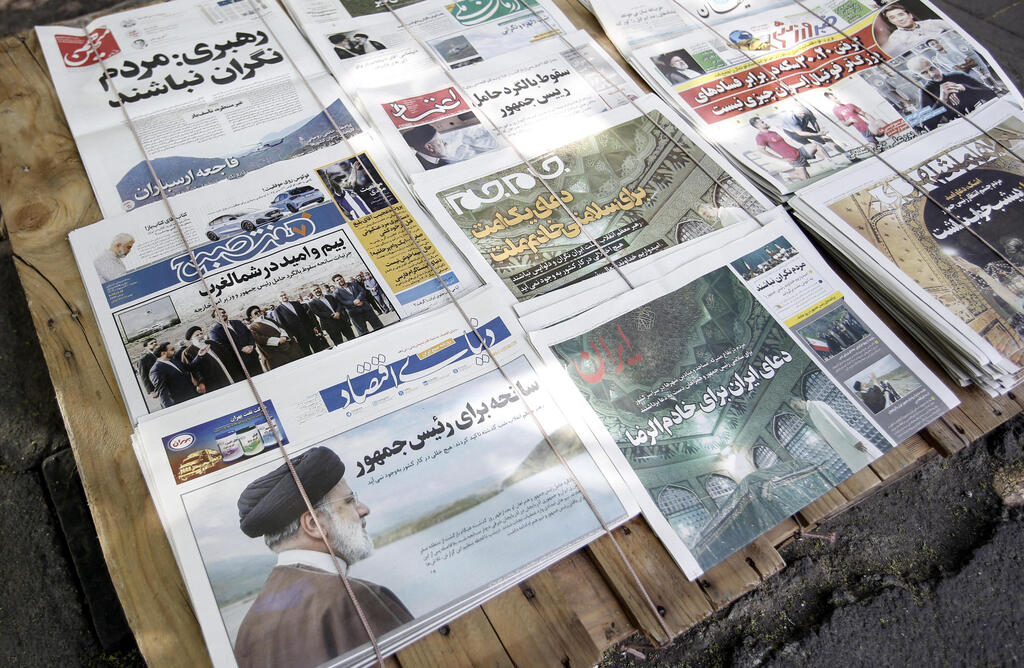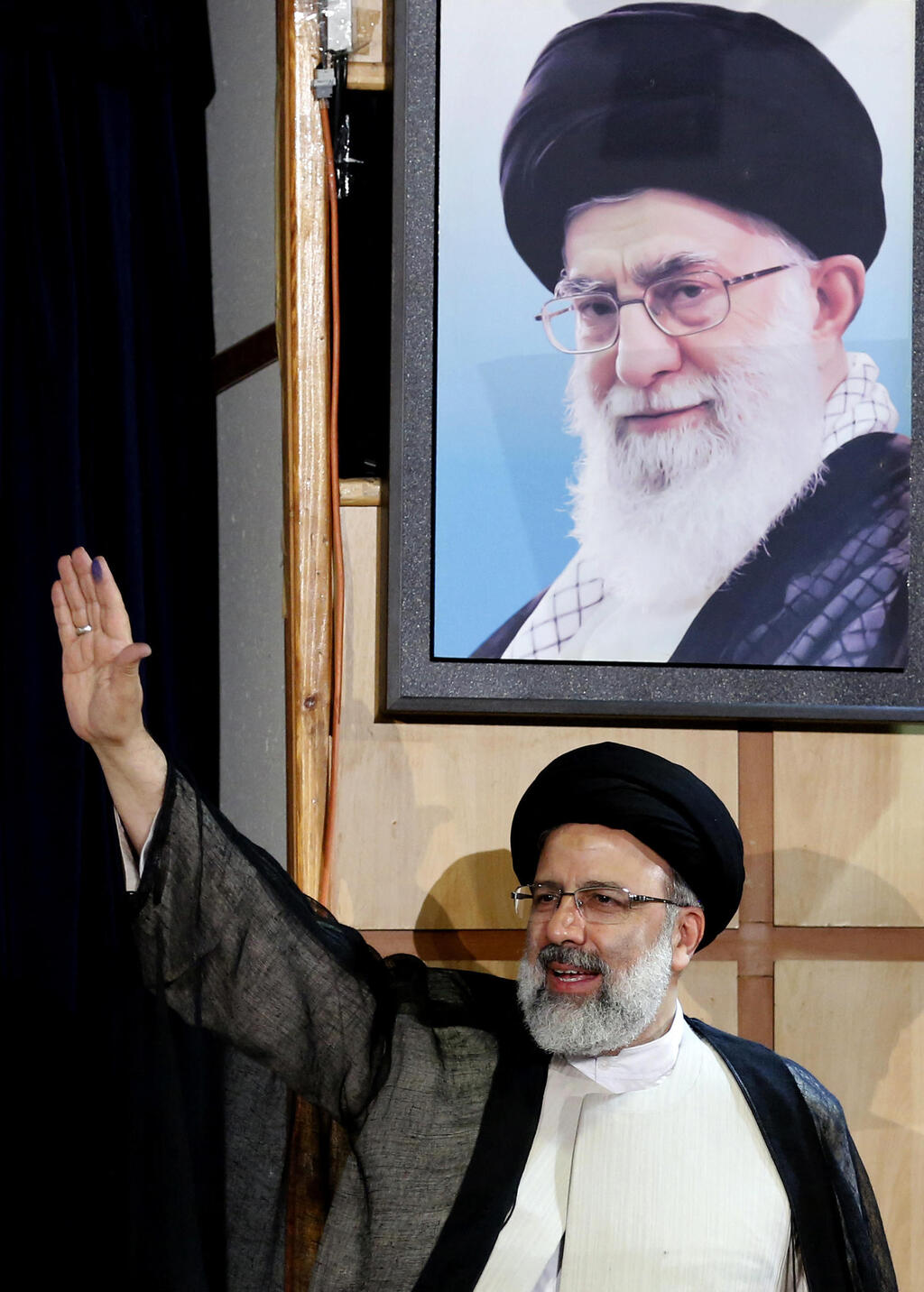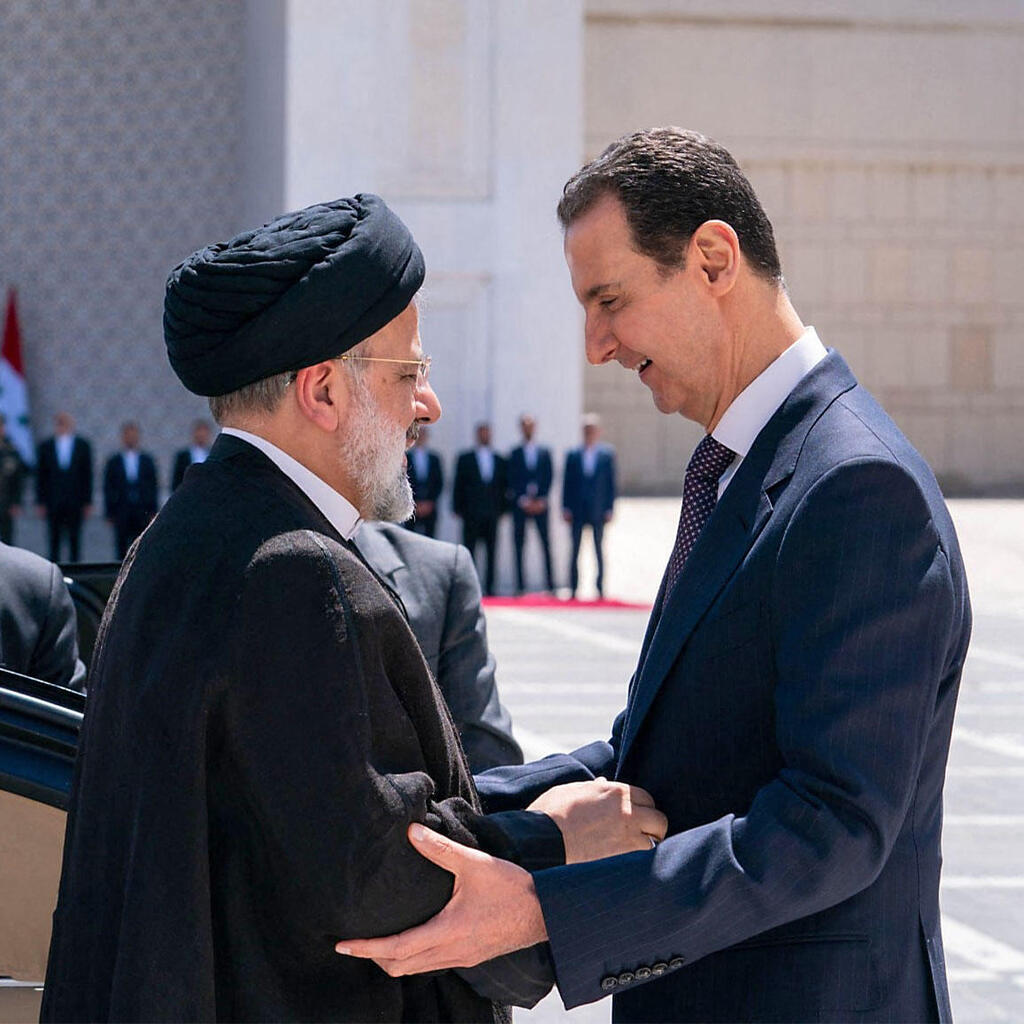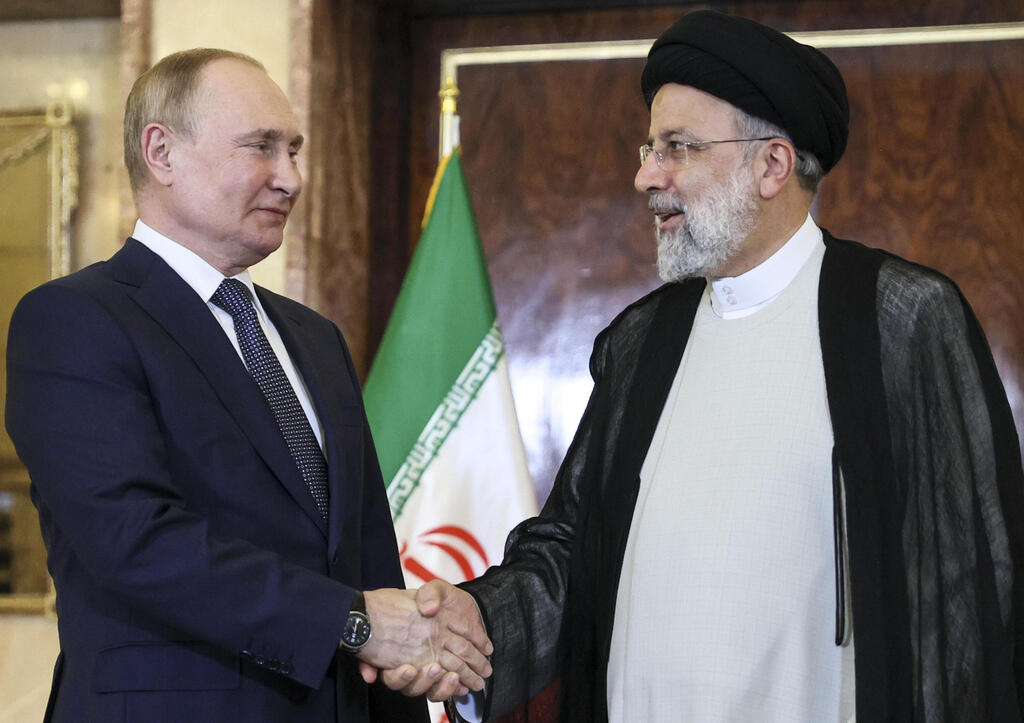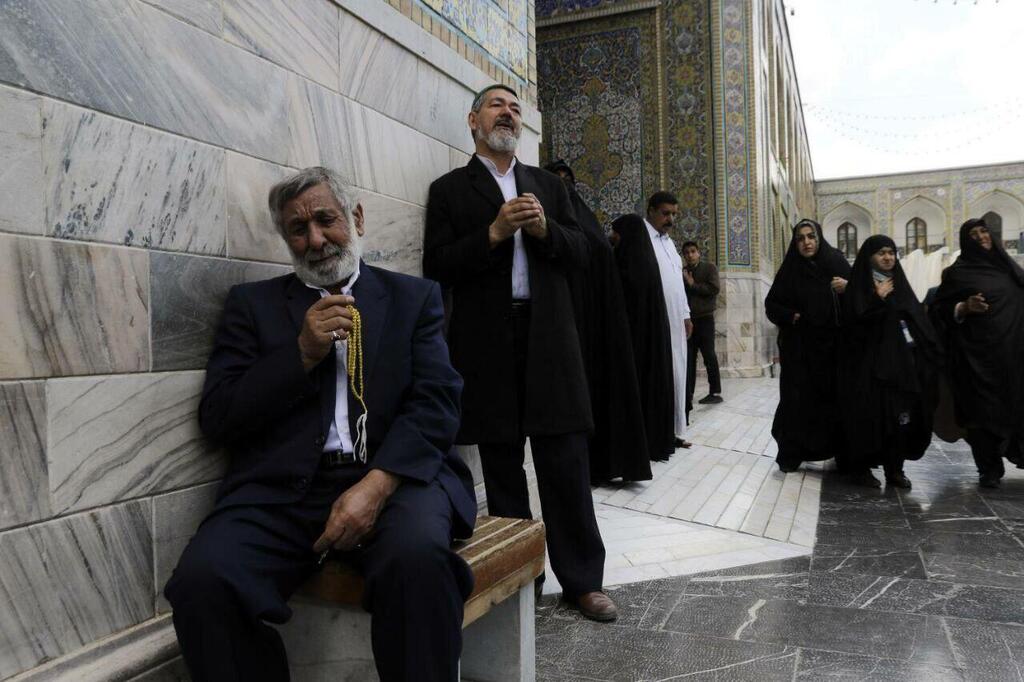Getting your Trinity Audio player ready...
The announcement of the death of Iranian President Ebrahim Raisi in a helicopter crash in the northern mountains of the country, along with other high-ranking officials, including Foreign Minister Hossein Amir-Abdollahian, has rocked the Islamic Republic at a particularly sensitive time.
Domestically, the regime is grappling with deep frustration over the dire economic situation and harsh repression, while internationally, it faces significant backlash for enriching uranium to near-weapons-grade levels, supporting Russia in its war against Ukraine and last month’s unprecedented attack on Israel.
6 View gallery
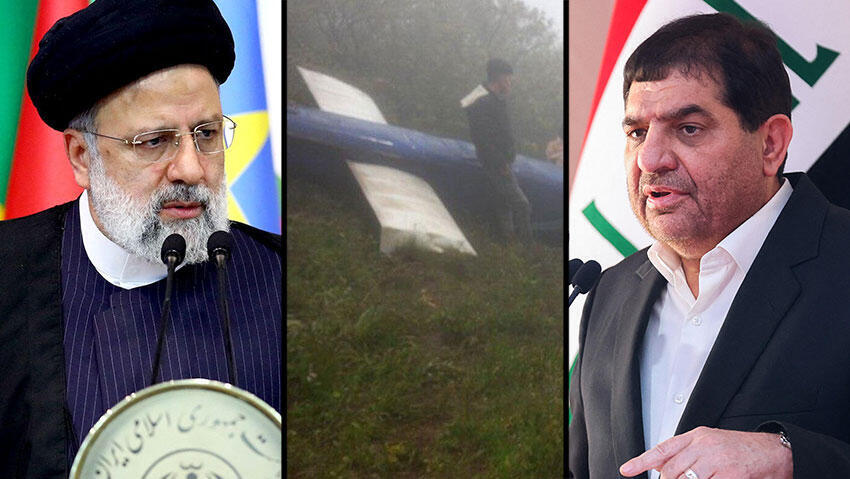

Iranian President Ebrahim Raisi and his deputy Mohammad Mokhber
(Photo: AFP PHOTO / HO / IRANIAN PRESIDENCY)
Although Supreme Leader Ayatollah Ali Khamenei has the final say in state affairs, the president, elected only if approved by Khamenei and regime leaders, holds significant powers, especially in domestic matters.
According to Iran's constitution, Vice President Mohammad Mokhber will act as interim president, pending approval from the supreme leader.
According to state television, Mokhber has already begun receiving phone calls from world leaders expressing their condolences on the death of Raisi. This suggests that Mokhber has started functioning as the acting president.
The Iranian government held an emergency meeting Monday morning, after which a statement was released promising to continue Raisi's path. "With God’s help and the support of the people, there will be no issues in governing the country," the statement read.
Despite this assurance, reports indicate that another exceptional meeting was held in the morning, involving representatives of the three branches of government, reflecting the regime's concern about the potential turmoil. Mokhber represented the executive branch at the meeting and reiterated the same sentiment. "We will continue Raisi's path without any disruptions," he said.
Alongside the appointment of an interim successor, Iran’s constitution mandates the formation of a council comprising the acting president, the speaker of parliament and the head of the judiciary. This council's role is to hold new presidential elections within 50 days.
Raisi was elected president of Iran in 2021, with the next presidential elections initially scheduled for next year. Now, they are expected to take place around July.
It remains unclear who will run in the upcoming elections, but as always, candidates will need the approval of the mullah regime, with Supreme Leader Khamenei making the final call.
A body evacuated from crash site of Raisi's helicopter
In the previous elections, amid widespread frustration over the disqualification of any candidate who could have posed a challenge to Raisi, voter turnout hit an all-time low in the Islamic Republic. This time, enthusiasm among Iranians is also expected to be low, especially given the harsh crackdown on the popular protests that erupted in 2022 following the death of Mahsa Amini.
Raisi marked as Khamenei’s successor, who’s next in line?
Mokhber himself is not a prominent figure in Iran, and it is unclear if he will try to leverage his role as acting president to run. Like Raisi, 68-year-old Mokhber is considered one of Khamenei’s close associates.
According to Reuters, Mokhber was part of an Iranian delegation that visited Moscow in October last year, agreeing to supply Russia with surface-to-surface missiles and additional drones for the war in Ukraine.
Mokhber became Raisi’s deputy when he was elected president in 2021 and previously headed an Iranian investment fund called Setad, which is linked to Khamenei. The fund, which manages assets "abandoned" during the chaos of the 1979 Islamic Revolution, is under U.S. sanctions.
Iranian crowds mourn Raisi's departure
Perhaps a more intriguing question than the identity of Iran’s next president is who will succeed Khamenei himself. Khamenei is 85 years old and has reportedly faced various health issues.
Raisi, who died in the crash, was seen as one of Khamenei’s protégés and was viewed by analysts as a potential candidate for the role of supreme leader. His election as president, facilitated by Khamenei’s disqualification of potential rivals during the 2021 campaign, was seen as another step in his grooming process.
Khamenei himself was Iran’s president during the 1980s under Ruhollah Khomeini and succeeded him upon his death.
With Raisi’s death, the only other name mentioned so far as a potential successor to Khamenei is his 55-year-old son, Mojtaba Khamenei. However, there is opposition in Iran to the idea of passing the role of supreme leader as a hereditary position, reminiscent of the transfer of power during the era of the Shah, who was overthrown in the Islamic Revolution.
From Nasrallah to Modi: global condolences pour in
Following the announcement of Raisi's death, a flurry of condolences began to emerge worldwide for the Iranian people, with Hamas and Yemen’s Houthi rebels among the first to offer their sympathies.
Hamas expressed its "deepest condolences and solidarity" to Khamenei, the Iranian government and the Iranian people following the deaths of Raisi and Foreign Minister Amir-Abdollahian.
In its statement, Hamas praised the deceased Iranian leaders for their steadfast support of the Palestinian cause and resistance against Israel. The terrorist group also expressed confidence that Iran's "deep-rooted institutions" will enable the country to overcome "the repercussions of this great loss."
Mohammed Ali al-Houthi, head of the Houthi Supreme Revolutionary Committee, wrote on X, "Our deepest condolences to the Iranian people, the Iranian leadership, and the families of President Raisi and the accompanying delegation on their reported martyrdom. We ask God to grant their families patience and solace. Verily we belong to Allah and to Him we shall return. The Iranian people will remain adhering to the loyal leaders of their people, by God's will."
Hezbollah, one of the key pillars of Iran’s so-called “Axis of Resistance” said it mourned "with deep sadness the martyrdom of Raisi, Abdollahian and others in a tragic incident."
It offered condolences to the Supreme Leader Ali Khamenei, the religious authorities, the leaders of Iran and its patient people.
It praised the struggle of the “martyrs” in defending the causes of the nation and their service to Iran, calling upon God to bless them with His mercy, to protect Khamenei and to grant Iran the ability to overcome the ordeal with patience and determination.
Meanwhile, Lebanon on Monday announced three days of national mourning for the Iranian president and foreign minister who were killed in the crash overnight.
Syrian President Bashar al-Assad, another close Tehran ally, affirmed Syria's solidarity with the Islamic Republic and the families of the dead, adding that Raisi's dedication to his work and duties had taken him to East Azerbaijan to inaugurate a vital project for his country, where he was martyred in the line of duty.
Raisi was visiting Azerbaijan to inaugurate a dam with Azerbaijani counterpart Ilham Aliyev, against the backdrop of tense relations between the two countries, partly due to Azerbaijan's close ties with Israel. The air incident apparently happened on his way back.
Assad added that Syria had worked with the late president to ensure strategic ties between Syria and Iran remained prosperous, recalling Raisi's important visit to Syria as part of enhancing ties for the benefit of both nations.
Russian President Vladimir Putin sent his condolences to Khamenei over Raisi's death and said that he had been a true friend of Russia.
"Please accept my deep condolences in connection with the great tragedy that befell the people of the Islamic Republic of Iran," Putin told Khamenei in a message, the Kremlin said.
"Seyed Ebrahim Raisi was an outstanding politician whose entire life was devoted to serving the Motherland," Putin said in his telegram.
"As a true friend of Russia, he made an invaluable personal contribution to the development of good neighborly relations between our countries and made great efforts to bring them to the level of strategic partnership."
Dry condolences were issued by European Union foreign affairs chief Josep Borrell and UAE President Mohammed bin Zayed, who expressed "solidarity" with the Iranian people.
The presidents of China and Egypt also extended their sympathies. Indian Prime Minister Narendra Modi said he was "shocked" by Raisi's death.
"His contribution to strengthening India-Iran bilateral relationship will always be remembered. My heartfelt condolences to his family and the people of Iran. India stands with Iran in this time of sorrow,” he said in a statement.
Pakistani Prime Minister Shehbaz Sharif noted it as a "great loss" and, like Lebanon, declared a day of mourning.
In Iran, numerous displays of mourning were seen on Monday. In the city of Tabriz, which is relatively close to the crash site, crowds gathered as the bodies of the victims were brought in. Images from Iran showed citizens weeping in mosques and a black flag raised in mourning over a Shia mosque in Qom.
However, many Iranians harbor deep resentment toward Raisi and other regime officials due to the brutal suppression of dissent and criticism. On social media, regime critics celebrated Raisi’s death.
Officials in Tehran have yet to disclose the cause of the helicopter crash, which occurred Sunday afternoon amid severe weather conditions in the wooded and mountainous region bordering Azerbaijan. The helicopter involved was an American-made Bell 212, likely one of the older models from before the 1979 Islamic Revolution that Iran continues to operate despite sanctions.
In recent years, reports have indicated that Iran struggles to obtain spare parts for these helicopters due to the ongoing sanctions.
Meanwhile, Former Iranian Foreign Minister Mohammad Javad Zarif accused the United States of being responsible for the helicopter crash. "The U.S. is responsible for Raisi's helicopter crash; it has banned the sale of aircraft and spare parts to Iran," Zarif said


